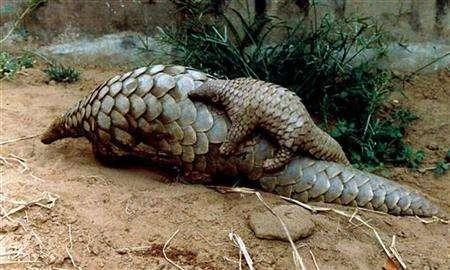
Though wildlife trafficking and crime have been continuing for the past decades, rhinos and elephant trafficking takes the major part of media's attention. Whereas, the little pangolin, an insect eating mammal is often over looked, despite being the most heavily trafficked among mammal species.
The Convention on International Trade in Endangered Species of Wild Fauna and Flora (CITES) reports pangolin as the highly trafficked mammal and most pangolin species are holding on for survival.
Pangolins live in the tropical parts of Asia and Africa and have eight species out of which six are classified as near threatened or endangered.
The Chinese Academy of Sciences and Chinese Public Security Bureau details the plight of the pangolin, according to a new report by Oxford University's Wildlife Conservation Research Unit (WildCRU).
Chris Newman of WildCRU and the co-author of the new report says that pangolin's own defense mechanism makes it susceptible to trafficking.
"When in jeopardy pangolins roll into a ball and can conveniently be bundled into a sack so that pangolin contraband is easy to transport and often goes unnoticed. Notebooks apprehended in 2009 from just one trafficking syndicate revealed that 22,000 pangolins were killed in just 21 months in the Bornean state of Sabah," said Newman.
A recent data suggests that around 10,000 pangolins are getting trafficked yearly, Newman explained.
Pangolins are trafficked as their scales are of great demand in traditional Chinese medicine. Around 500 grams of pangolins scales can be sold up to $350, the researchers said in a statement.
"The number of pangolins traded are shocking, and all the more so considering the pharmaceutical pointlessness of the trade. This trade is intolerably wasteful." said study co-author David Macdonald, Director of the WildCRU.
Since 2010, researchers have found and seized 2,592 kilograms of pangolin scales from China's Yunnan Province alone and an additional 220 living, 39 dead pangolins have been seized, researchers added in the statement.
"Many impounded outside of China are likely released inappropriately into local forests or euthanized. Of 326 pangolins placed in the Yunnan Sanctuary of Wildlife since 2008, only 76 Malayan pangolins and 22 Chinese pangolins survived." said study co-author Youbing Zhou of the Chinese Academy of Sciences.











